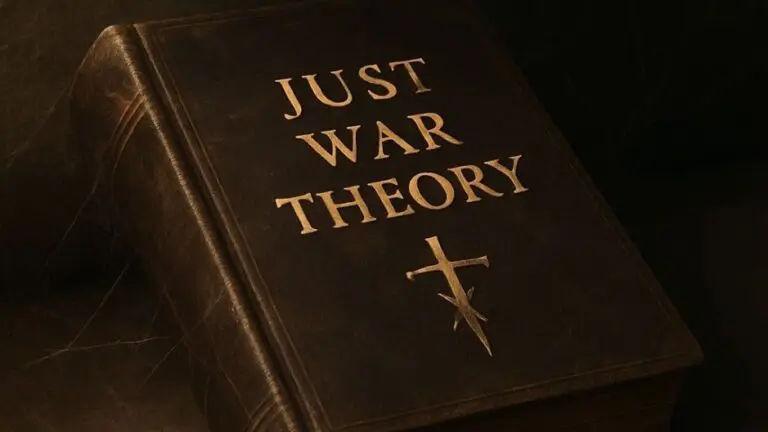
James Lindsay often warns about the “woke right”—those aligned with the political right who abandon principle for tribe, trade truth for political advantage, and use the same tactics as the “woke left” to get there. And I think he’s right to be concerned. But the irony is thick: because when he responded to critics of Israel’s war in Gaza by demanding they justify their moral framework against the behavior of Hamas, he wasn’t standing up for principle—he was doing exactly what he warns against.
To be clear, neither I nor LCI defend Hamas or its atrocities. Israel has a legitimate right to self-defense, and responding to aggression is compatible with Just War Theory. But too often, people invoke that right while ignoring the rest of what the doctrine requires. That’s why it’s worth stepping back and clearly defining what Just War Theory actually is.
Let’s talk about it.
Just War Theory didn’t come out of nowhere—it’s a deeply Christian tradition rooted in Scripture, theology, and moral reasoning. It’s not a political slogan. It’s not a tribal cudgel. It’s a centuries-long effort by Christian thinkers to wrestle with one of the hardest moral questions: When, if ever, is it just to go to war?
The earliest form of Just War thinking comes from St. Augustine in the 4th–5th century. Augustine wasn’t some warmonger. He lived through the collapse of Rome and was deeply grieved by violence and bloodshed. But he also recognized that in a fallen world, justice sometimes requires force. What he laid out was a careful and humble framework: war is only just if it’s aimed at restoring peace, punishing grave evil, and protecting the innocent. Not for conquest. Not for pride. Not for revenge.
Later, St. Thomas Aquinas in the 13th century expanded and refined this doctrine in his Summa Theologica, organizing it under three key principles:
This foundation was built upon by Christian jurists and philosophers throughout the centuries—people like Francisco de Vitoria and Hugo Grotius—who brought these ideas into discussions of international law and ethics. Even Enlightenment thinkers borrowed from this moral tradition to shape what would become modern humanitarian law and the rules of war.
The point is: Just War Theory has Christian origins. It’s a deeply moral attempt to restrain evil in a world where evil exists. But that restraint must be consistent. And it must apply to everyone.
Just War isn’t “your team good, their team bad.” It’s not about justifying violence for the people you like. It’s about asking the hard questions before and during war.
The traditional categories break down like this:
If you’re not following all of that—all of it—then you’re not waging a just war. You’re just waging war.
No.
Let’s start with Jus ad bellum. Has Israel exhausted peaceful alternatives? No. For decades, it has:
Undermined Palestinian moderates
Quietly propped up Hamas as a political wedge
Maintained an ongoing blockade of Gaza
Expanded settlements in violation of international law
Rejected serious peace proposals and instead doubled down on control
None of this justifies Hamas’ actions. But it does call into question the claim that Israel has done everything in its power to avoid war. That’s a requirement of Just War Theory—not a suggestion.
And when it comes to Jus in bello, we see:
This is not the moral high ground. This is not proportional or just.
It’s often argued that Hamas hides among civilians and uses human shields, making civilian casualties unavoidable. While the frequency or degree by which this happens is generally overstated, it is true that this is sometimes the case and such situations present real challenges – as does all urban warfare. However, Just War Theory doesn’t give a blank check to kill civilians simply because the enemy is immoral or because it is more difficult to fight the enemy while avoiding civilian casualties. The presence of human shields doesn’t erase the obligation to discriminate between combatants and non-combatants or to use proportional force. In fact, it heightens the moral responsibility to act with restraint. As Christians, we must remember the words of Paul in Romans 12 – we cannot overcome evil with evil.
Now, I want to be clear here. I’m not saying that because Israel has not exhausted all peaceful alternatives over the years doesn’t mean it forfeits the right to self-defense today. Responding to an attack like Hamas’s on October 7 is morally justified. But if Israel wants that response to be truly just, it must also reckon with how its long-term policies—settlements, blockades, and political manipulation—have fueled the conditions that led to war. Just War Theory requires more than reactive force; it demands a pursuit of justice that aims toward peace. If Israel continues to treat Palestinians unjustly while responding militarily to Hamas, it not only fails the moral standard—it guarantees the cycle of violence will repeat.
What James Lindsay is doing—what many others are doing—is demanding that only Hamas be held to moral standards. But that’s not how justice works. You don’t get to quote Augustine when you want to condemn terrorism and then ignore him when you want to excuse war crimes.
You either believe justice is universal—or you don’t believe in justice at all.
You don’t have to be “anti-Israel” to say that Israel has violated these principles. You just have to be honest. You have to be consistent. You have to care about morality more than tribal loyalty.
From a Christian libertarian perspective, I hold two truths together:
It must be exercised with moral restraint. With accountability. With wisdom.
Jesus told us to love our enemies. He didn’t say “don’t protect the innocent”—but he did say to pursue peace. And that command isn’t suspended when we’re angry or afraid. In fact, that’s exactly when we’re tested.
As a libertarian, I also know that the State often uses war to expand its power, to mask its failures, and to manufacture consent through fear. And as a Christian, I believe the true battle is not against flesh and blood but against the spiritual forces of evil. That doesn’t mean we never fight—but it means we must never glorify war or let it consume our principles.
James Lindsay warns about the “woke right”—tribalism wrapped in moral rhetoric, sacrificing principle for power.
The irony? That’s exactly what he’s doing here.
Demanding that moral standards only apply to your enemies is the oldest trick in the authoritarian playbook. It’s not moral clarity. It’s moral convenience.
And one of the most egregious examples of this is the argument that “all Palestinians are complicit” or that “they elected Hamas, so they deserve what they get.” That’s not ‘Just War’ reasoning. That’s collective punishment. And it’s explicitly rejected by both Christian moral teaching and the Just War tradition. Children didn’t vote for Hamas. Refugees in camps didn’t vote for Hamas. Many Gazans who did vote were doing so nearly two decades ago under duress, in a broken political system (and even then, Hamas didn’t win a majority in ANY district, & only gained full control through force)
I’m not afraid to “put up.” Here’s my theory. It’s rooted in Scripture, in Christian tradition, in moral philosophy, and in a belief that justice must apply to everyone—even when it’s politically inconvenient.
The question is: do you still believe in principles? Or are you just another partisan demanding that we shut up and fall in line?
Because I won’t.
I’ll stand where Christ calls us to stand: For peace, for truth, and for a justice that never bends to power.
Articles posted on LCI represent a broad range of views from authors who identify as both Christian and libertarian. Of course, not everyone will agree with every article, and not every article represents an official position from LCI. Please direct any inquiries regarding the specifics of the article to the author.
Did you read this in a non-English version? We would be grateful for your feedback on our auto-translation software.



















































*by signing up, you also agree to get weekly updates to our newsletter
Sign up and receive updates any day we publish a new article or podcast episode!